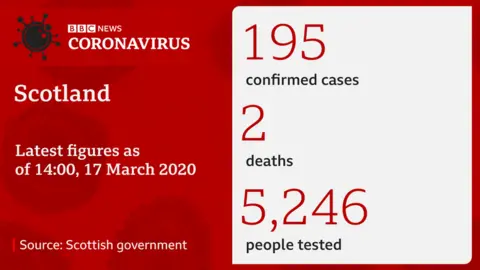'Highly possible' Scottish schools could shut within days
Nicola Sturgeon has said that Scotland could see nationwide school closures within days.
The first minister appeared on Reporting Scotland before talks with Education Secretary John Swinney on measures to reduce the spread of coronavirus.
She said: "It is highly possible we will see a more blanket approach to school closures in the coming days."
It comes after a second person died in Scotland after becoming infected.
At present, schools in Scotland remain open, though attendance is reported to be low in some areas and most activities, clubs and trips have been cancelled.
Ms Sturgeon said a blanket closure of schools was not being recommended because of the impact on children's welfare and on frontline NHS and social care staff.
'Pressure on teachers'
She added that this approach was "not fixed" and that scientists were still looking at evidence.
However, she acknowledged that as the virus spreads, teacher absences were increasing and there was "pressure" on teacher attendance.
Ms Sturgeon said the protection of children and the population was the "driving force" behind the decision-making.
General secretary of Scotland's largest teaching union, Larry Flanagan, said the EIS wanted the Scottish government to "get ahead of the game" so that schools could plan for closures.
He told BBC Scotland's The Nine that provisions could be made for young people who relied on free school meals.
"Schools could be open on a limited basis in relation to providing some support for groups of young people," he said.
"What we'd like to see is a planned arrangement around the impact of school closures and trying to maintain that support for critical groups of parents or for pupils themselves."

Earlier, it was confirmed that the number of confirmed cases in Scotland is 195 - a rise of 24 from Monday.
The elderly patient who became the second person in Scotland to die from the virus was being treated by NHS Greater Glasgow and Clyde and had underlying health conditions.
Scottish Health Secretary Jeane Freeman said she was formally putting NHS Scotland on an "emergency footing".
The measure, under sections 1 and 78 of the 1978 NHS Scotland Act, will be in place for at least three months.
Ms Freeman told MSPs: "Our goal is simple: to protect and save lives and we need everyone's help to achieve this."
She said a "swift and radical change" was needed in the way the NHS does its work, calling it the most rapid reconfiguration of the health service in its 71-year history.
The key actions are:
- Doubling the number of intensive care beds
- Increasing number of hospital beds by 3,000
- Non-urgent elective operations will be suspended
- Urgent care such as cancer treatment will continue
Ms Freeman also assured MSPs that further supplies of protective equipment had been issued to health boards for distribution to GPs by 20 March.
She added: "Our nation faces a challenge to its way of life and to public health in a manner that has never been seen before in our lifetimes."
The highest number of coronavirus cases in Scotland is in the NHS Greater Glasgow and Clyde region, with 49 cases confirmed on Tuesday.
The first patient to die in Scotland was being being treated by NHS Lothian, which has the second highest number of cases.
The number of people who have died with the virus in the UK has reached 56, with 1,950 people testing positive for Covid-19 - although the actual number of cases could be as high as 55,000.
In the last 24 hours, the UK government has announced a range of measures designed to slow the spread of the virus.
They include advice that entire households should self-isolate for 14 days if one member has symptoms - either a new cough or fever.
Britons have also been advised to avoid all non-essential foreign travel for the next 30 days.

- EASY STEPS: How to keep safe
- A SIMPLE GUIDE: What are the symptoms?
- GETTING READY: What is the UK's 'delay' phase?
- TRAVEL PLANS: What are your rights?
- IN-DEPTH: Coronavirus pandemic

